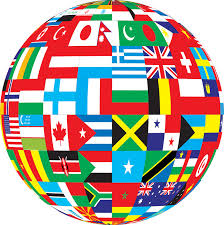One of the best lessons I ever learned about knowing my international territories came in Budapest, Hungary at DISCOP; a Film and TV content market “for growing world regions.” I was at dinner with Edward Stencel, (a dear friend who ran my company with me for five years) and some new clients. We were at a hip restaurant on a boat called “Spoon,” when the conversation shifted to the emergence of Benelux. Benelux, I thought. What the hell is Benelux? It sounded like a virus, or a new military coup. As dinner wore on, I started to wonder why I’d never heard of it. Flashbacks of seventh grade suddenly arrested my thoughts as I remembered getting a “C” instead of a “B” on a world geography test because I failed to list the countries in North America (I listed the USA and Canada, but missed Mexico). So, before desert was upon us, I asked Edward where Benelux was. He just gave me a look and said “Benelux isn’t a country. It stands for Belgium, Netherlands and Luxemburg.” I was surprised, but relieved.
The thing about film sales territories is you have to know where and what they are and how they work – before they can work for your film. Currently there’s about forty territories worldwide, but less than ten that will be financially significant to your film. I’m not saying that most film territories are insignificant, since all of them provide a vital platform for getting your film out. Nor am I saying your film will only sell to ten territories (although you should do cartwheels if it does sell to ten territories). What I am saying is don’t be surprised if some of the smaller territories offer you such little money for your film that you’re too offended to say yes.
My rule of thumb is simple: If the offer is a) less than the cost of my Fed EX and related shipping costs to complete the deal, or b) if I know our client will surely go into cardiac arrest after hearing the offer, then I can’t accept it. But filmmakers-be-warned: there are more than a few distributors out there who will accept lowball deals. Those deals are too small to ever help you, and you’ll never see any money from them because they’ll be eaten up in your distributor’s fees.
Since there are many more “territorial insights” that you need to know, here are some key ones to consider.

How Territory Sales Work
Don’t worry. It’s simpler than it seems. Basically, buyers will offer to pay your distributor a “flat fee” for the right to distribute your film in their country. You get paid and they get your film. It’s that simple. They’ll pay for all language dubs and they’ll duplicate and market VOD and DVD in their country. In rare cases, you can also get a back-end bonus on your VOD and DVD sales put into your contract. But, it’s almost impossible to get a distributor in another country to pay those bonuses. I’m sure it has happened before, but such a magical occurrence happens about as often as people prove the existence of Santa Claus.

 \
\

The Most Significant Territories
China, Germany, Japan and the UK are the key territories. Getting healthy sales there will significantly increase the value of your sales in smaller territories. But, the opposite is also true. A weak sale to the big four equals almost no sales in smaller territories.
Key Notes About Some Territories
1) Germany usually also includes German-speaking Switzerland.
2) France is very hard to sell to, because their government limits how much American product can be distributed.
3) Unlike other territories, Japan is not a place where a distributor can swoop in and make a quick buck. But, if nurtured correctly with honor, a relationship with Japan can provide decades of healthy sales.

What’s In A Title?
Your film’s title will probably change overseas.

What’s In A Look?
You film’s artwork will also change in other countries. But don’t fear, they’re just trying to position your film in its best light to capture healthy sales. Actually, you should request posters of your film from the various countries your film sells to. That fun exercise will do two things: 1) Create a great conversation piece for your friends, future investors and lovers when they see how many different countries your film played in, and 2) You’ll get a sense on how your work is being marketed to other countries.

What’s In A Final Cut?
Some territories will re-edit your film in order to get it approved by their censor boards, or to make it more acceptable to their viewing audiences. I know this cuts into the hearts of many filmmakers, but think about it this way: is cutting out sixty-eight seconds from your film worth getting a $75,000 sale? Or, worse yet, is keeping your sixty-eight seconds worth losing a $75,000 sale? Hmmm, things to consider.

Financing Your Film From Territory Sales
The problem is territories won’t pay until after your film is completed. The ones that will agree to cutting a check before you start shooting will only do so in pre-sales.

Pre-Sales
Pre-sales are when a territory buys your film before you finish it, or sometimes even before you make it. But, these deals are generally reserved for star-driven films, which are made in “slam-dunk” genres (action, thriller, sci-fi).
There’s a ton of things to know about the various territories, as their cultures, tastes, and business practices vary so much. All of those elements factor into what kinds of films each territory will buy and how much they’ll pay for them. In closing, I know the thought of understanding the various needs of each territory can be daunting. But, how is that different from understanding the needs and wants of your significant other who is wondering why you’re reading this article instead of spending “quality time” with them? In both cases, do the best you can, and let the universe figure out the rest.
That’s what I have today. Before I go, here’s a funny international video:
Additionally, here’s a link to my podcast, Limping On Cloud 9, which is positivity infused, so it may serve as a short getaway for you.
I thank you for lending me your eyes and ears, and I look forward to borrowing them again.

